An Analysis of Women's Representation in Chinese Movies
VerifiedAdded on 2022/08/19
|9
|2812
|19
Essay
AI Summary
This essay provides an in-depth analysis of the representation of women's issues in three significant Chinese films: "Yellow Earth," "Ju Dou," and "Raise the Red Lantern." The essay explores how these movies depict the challenges faced by women in Chinese society, particularly focusing on issues related to marriage, societal expectations, and the limited agency of women within a male-dominated framework. The analysis examines the historical context, cultural nuances, and cinematic techniques employed in each film to highlight the struggles, subjugation, and resilience of women. The essay underscores how these movies serve as powerful reflections of the status and position of women in traditional Chinese society, portraying their roles as commodities, their lack of autonomy, and the consequences of these societal norms. The films are examined for their portrayal of themes such as forced marriages, domestic abuse, and the competition among women for male attention, all of which are shown as key issues faced by Chinese women. The essay concludes by emphasizing the enduring relevance of these films in understanding the historical and cultural context of women's experiences in China.
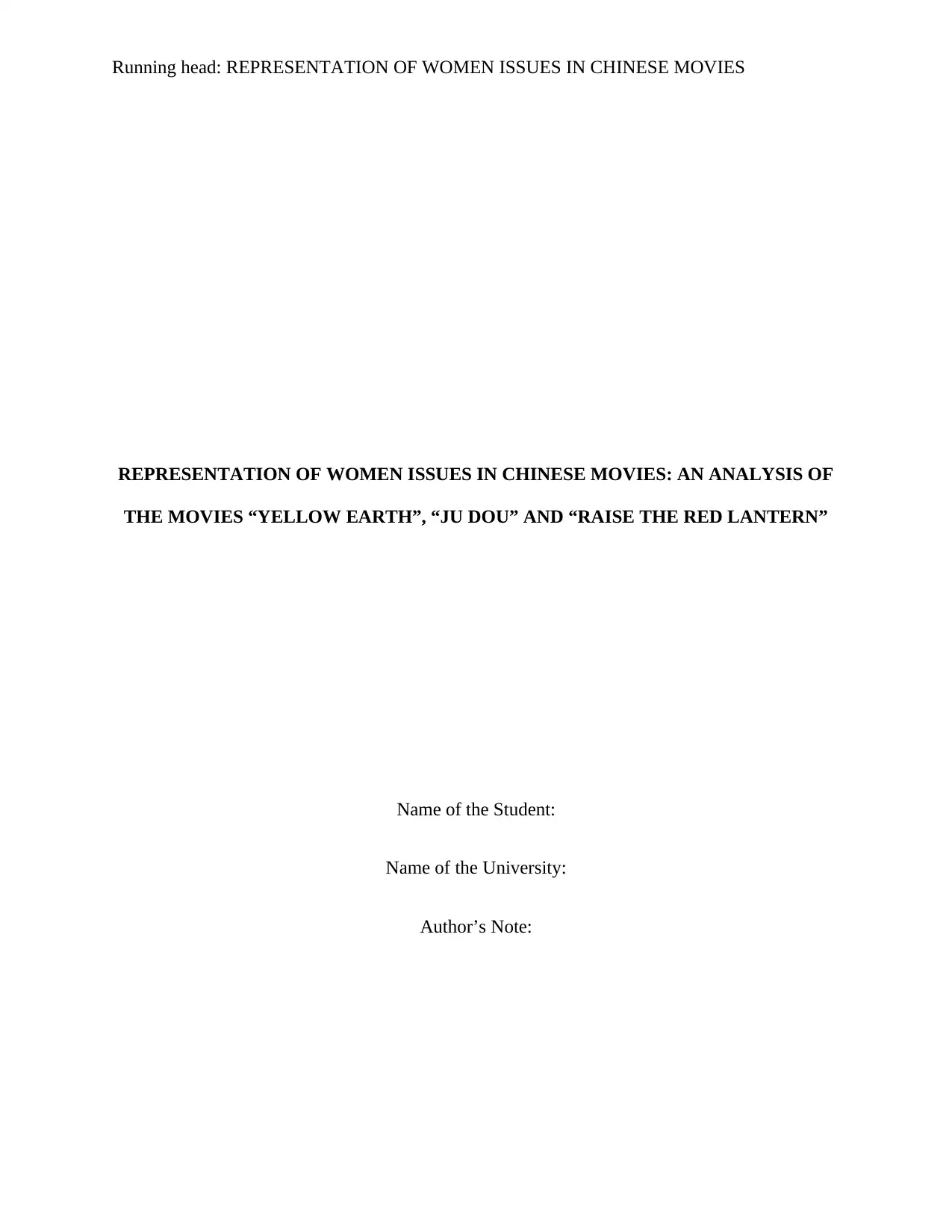
Running head: REPRESENTATION OF WOMEN ISSUES IN CHINESE MOVIES
REPRESENTATION OF WOMEN ISSUES IN CHINESE MOVIES: AN ANALYSIS OF
THE MOVIES “YELLOW EARTH”, “JU DOU” AND “RAISE THE RED LANTERN”
Name of the Student:
Name of the University:
Author’s Note:
REPRESENTATION OF WOMEN ISSUES IN CHINESE MOVIES: AN ANALYSIS OF
THE MOVIES “YELLOW EARTH”, “JU DOU” AND “RAISE THE RED LANTERN”
Name of the Student:
Name of the University:
Author’s Note:
Paraphrase This Document
Need a fresh take? Get an instant paraphrase of this document with our AI Paraphraser
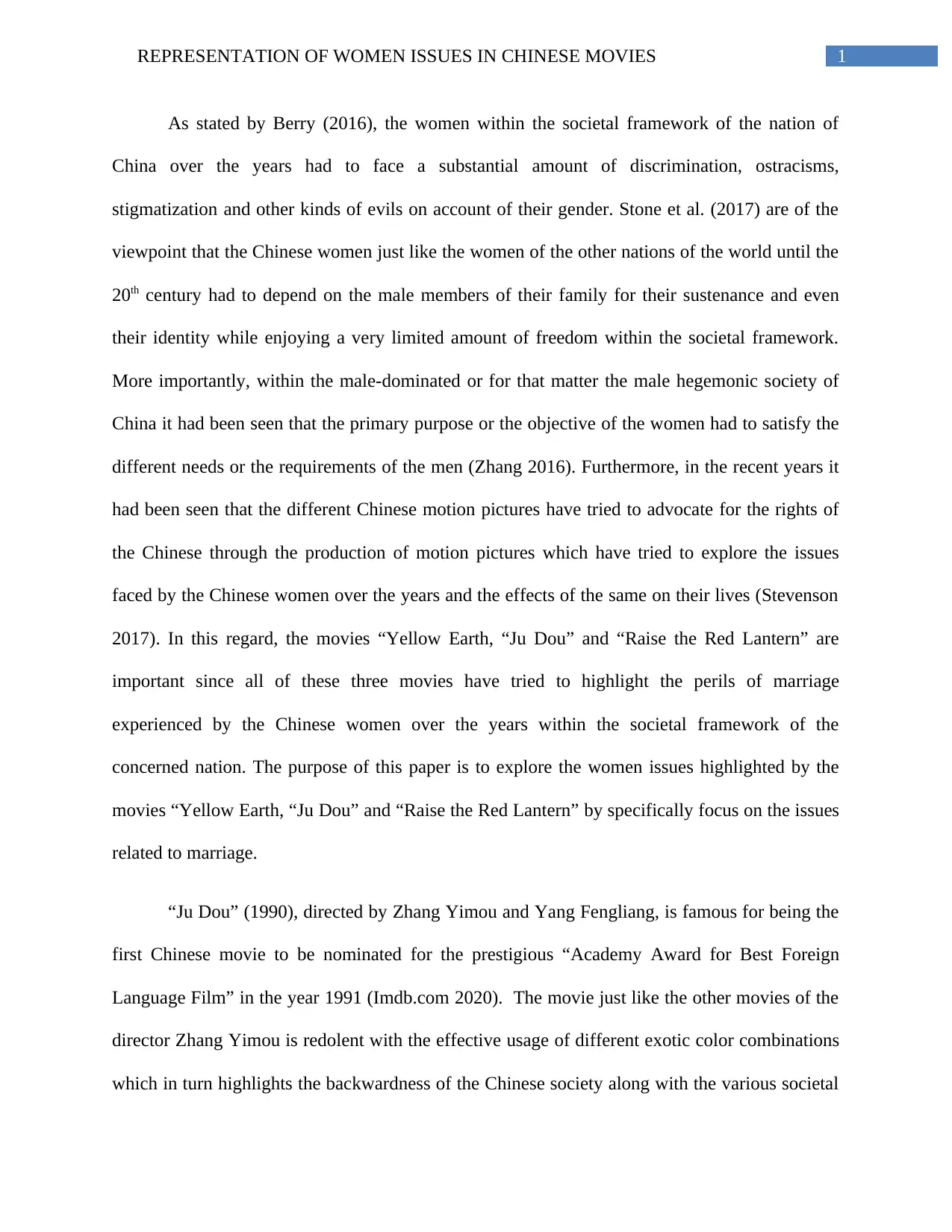
1REPRESENTATION OF WOMEN ISSUES IN CHINESE MOVIES
As stated by Berry (2016), the women within the societal framework of the nation of
China over the years had to face a substantial amount of discrimination, ostracisms,
stigmatization and other kinds of evils on account of their gender. Stone et al. (2017) are of the
viewpoint that the Chinese women just like the women of the other nations of the world until the
20th century had to depend on the male members of their family for their sustenance and even
their identity while enjoying a very limited amount of freedom within the societal framework.
More importantly, within the male-dominated or for that matter the male hegemonic society of
China it had been seen that the primary purpose or the objective of the women had to satisfy the
different needs or the requirements of the men (Zhang 2016). Furthermore, in the recent years it
had been seen that the different Chinese motion pictures have tried to advocate for the rights of
the Chinese through the production of motion pictures which have tried to explore the issues
faced by the Chinese women over the years and the effects of the same on their lives (Stevenson
2017). In this regard, the movies “Yellow Earth, “Ju Dou” and “Raise the Red Lantern” are
important since all of these three movies have tried to highlight the perils of marriage
experienced by the Chinese women over the years within the societal framework of the
concerned nation. The purpose of this paper is to explore the women issues highlighted by the
movies “Yellow Earth, “Ju Dou” and “Raise the Red Lantern” by specifically focus on the issues
related to marriage.
“Ju Dou” (1990), directed by Zhang Yimou and Yang Fengliang, is famous for being the
first Chinese movie to be nominated for the prestigious “Academy Award for Best Foreign
Language Film” in the year 1991 (Imdb.com 2020). The movie just like the other movies of the
director Zhang Yimou is redolent with the effective usage of different exotic color combinations
which in turn highlights the backwardness of the Chinese society along with the various societal
As stated by Berry (2016), the women within the societal framework of the nation of
China over the years had to face a substantial amount of discrimination, ostracisms,
stigmatization and other kinds of evils on account of their gender. Stone et al. (2017) are of the
viewpoint that the Chinese women just like the women of the other nations of the world until the
20th century had to depend on the male members of their family for their sustenance and even
their identity while enjoying a very limited amount of freedom within the societal framework.
More importantly, within the male-dominated or for that matter the male hegemonic society of
China it had been seen that the primary purpose or the objective of the women had to satisfy the
different needs or the requirements of the men (Zhang 2016). Furthermore, in the recent years it
had been seen that the different Chinese motion pictures have tried to advocate for the rights of
the Chinese through the production of motion pictures which have tried to explore the issues
faced by the Chinese women over the years and the effects of the same on their lives (Stevenson
2017). In this regard, the movies “Yellow Earth, “Ju Dou” and “Raise the Red Lantern” are
important since all of these three movies have tried to highlight the perils of marriage
experienced by the Chinese women over the years within the societal framework of the
concerned nation. The purpose of this paper is to explore the women issues highlighted by the
movies “Yellow Earth, “Ju Dou” and “Raise the Red Lantern” by specifically focus on the issues
related to marriage.
“Ju Dou” (1990), directed by Zhang Yimou and Yang Fengliang, is famous for being the
first Chinese movie to be nominated for the prestigious “Academy Award for Best Foreign
Language Film” in the year 1991 (Imdb.com 2020). The movie just like the other movies of the
director Zhang Yimou is redolent with the effective usage of different exotic color combinations
which in turn highlights the backwardness of the Chinese society along with the various societal
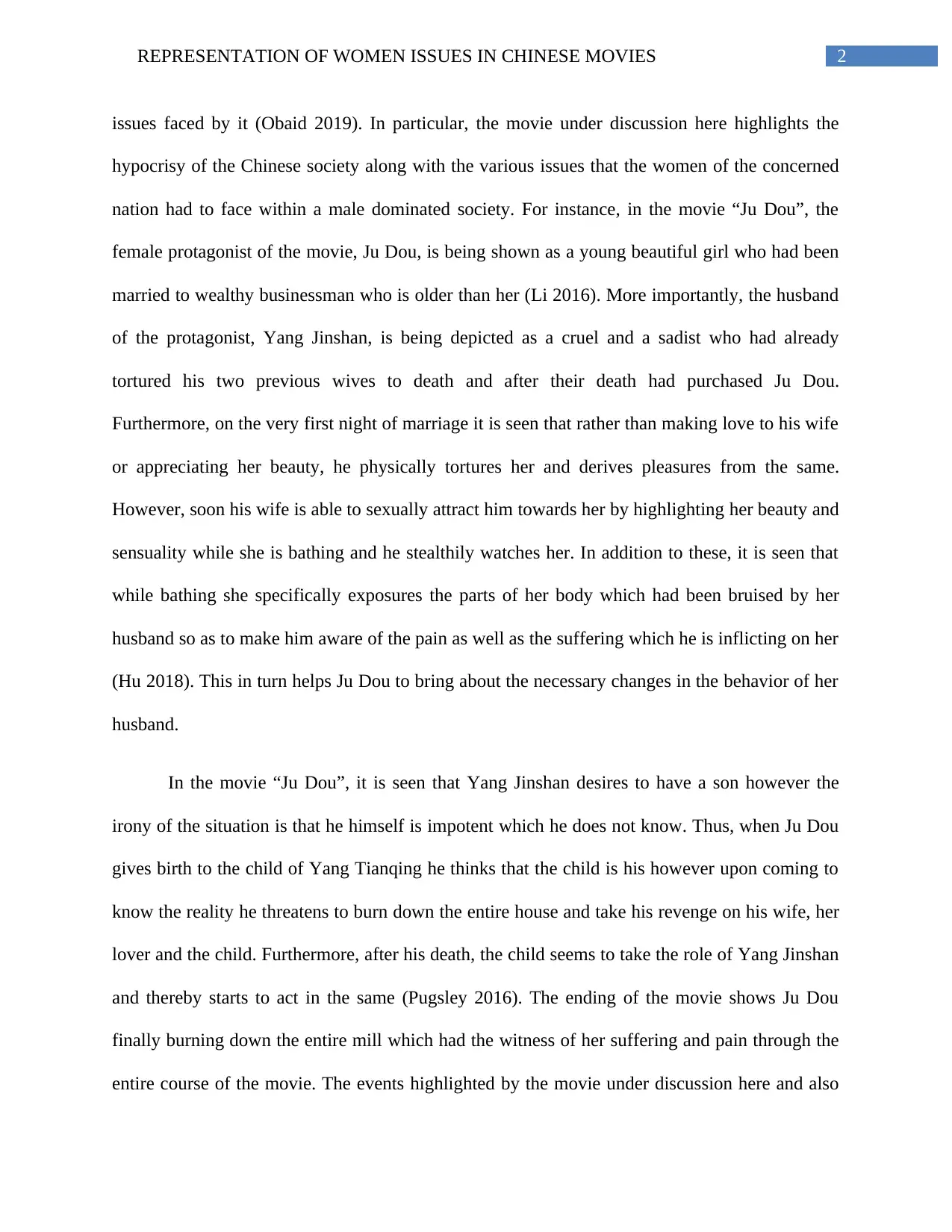
2REPRESENTATION OF WOMEN ISSUES IN CHINESE MOVIES
issues faced by it (Obaid 2019). In particular, the movie under discussion here highlights the
hypocrisy of the Chinese society along with the various issues that the women of the concerned
nation had to face within a male dominated society. For instance, in the movie “Ju Dou”, the
female protagonist of the movie, Ju Dou, is being shown as a young beautiful girl who had been
married to wealthy businessman who is older than her (Li 2016). More importantly, the husband
of the protagonist, Yang Jinshan, is being depicted as a cruel and a sadist who had already
tortured his two previous wives to death and after their death had purchased Ju Dou.
Furthermore, on the very first night of marriage it is seen that rather than making love to his wife
or appreciating her beauty, he physically tortures her and derives pleasures from the same.
However, soon his wife is able to sexually attract him towards her by highlighting her beauty and
sensuality while she is bathing and he stealthily watches her. In addition to these, it is seen that
while bathing she specifically exposures the parts of her body which had been bruised by her
husband so as to make him aware of the pain as well as the suffering which he is inflicting on her
(Hu 2018). This in turn helps Ju Dou to bring about the necessary changes in the behavior of her
husband.
In the movie “Ju Dou”, it is seen that Yang Jinshan desires to have a son however the
irony of the situation is that he himself is impotent which he does not know. Thus, when Ju Dou
gives birth to the child of Yang Tianqing he thinks that the child is his however upon coming to
know the reality he threatens to burn down the entire house and take his revenge on his wife, her
lover and the child. Furthermore, after his death, the child seems to take the role of Yang Jinshan
and thereby starts to act in the same (Pugsley 2016). The ending of the movie shows Ju Dou
finally burning down the entire mill which had the witness of her suffering and pain through the
entire course of the movie. The events highlighted by the movie under discussion here and also
issues faced by it (Obaid 2019). In particular, the movie under discussion here highlights the
hypocrisy of the Chinese society along with the various issues that the women of the concerned
nation had to face within a male dominated society. For instance, in the movie “Ju Dou”, the
female protagonist of the movie, Ju Dou, is being shown as a young beautiful girl who had been
married to wealthy businessman who is older than her (Li 2016). More importantly, the husband
of the protagonist, Yang Jinshan, is being depicted as a cruel and a sadist who had already
tortured his two previous wives to death and after their death had purchased Ju Dou.
Furthermore, on the very first night of marriage it is seen that rather than making love to his wife
or appreciating her beauty, he physically tortures her and derives pleasures from the same.
However, soon his wife is able to sexually attract him towards her by highlighting her beauty and
sensuality while she is bathing and he stealthily watches her. In addition to these, it is seen that
while bathing she specifically exposures the parts of her body which had been bruised by her
husband so as to make him aware of the pain as well as the suffering which he is inflicting on her
(Hu 2018). This in turn helps Ju Dou to bring about the necessary changes in the behavior of her
husband.
In the movie “Ju Dou”, it is seen that Yang Jinshan desires to have a son however the
irony of the situation is that he himself is impotent which he does not know. Thus, when Ju Dou
gives birth to the child of Yang Tianqing he thinks that the child is his however upon coming to
know the reality he threatens to burn down the entire house and take his revenge on his wife, her
lover and the child. Furthermore, after his death, the child seems to take the role of Yang Jinshan
and thereby starts to act in the same (Pugsley 2016). The ending of the movie shows Ju Dou
finally burning down the entire mill which had the witness of her suffering and pain through the
entire course of the movie. The events highlighted by the movie under discussion here and also
⊘ This is a preview!⊘
Do you want full access?
Subscribe today to unlock all pages.

Trusted by 1+ million students worldwide
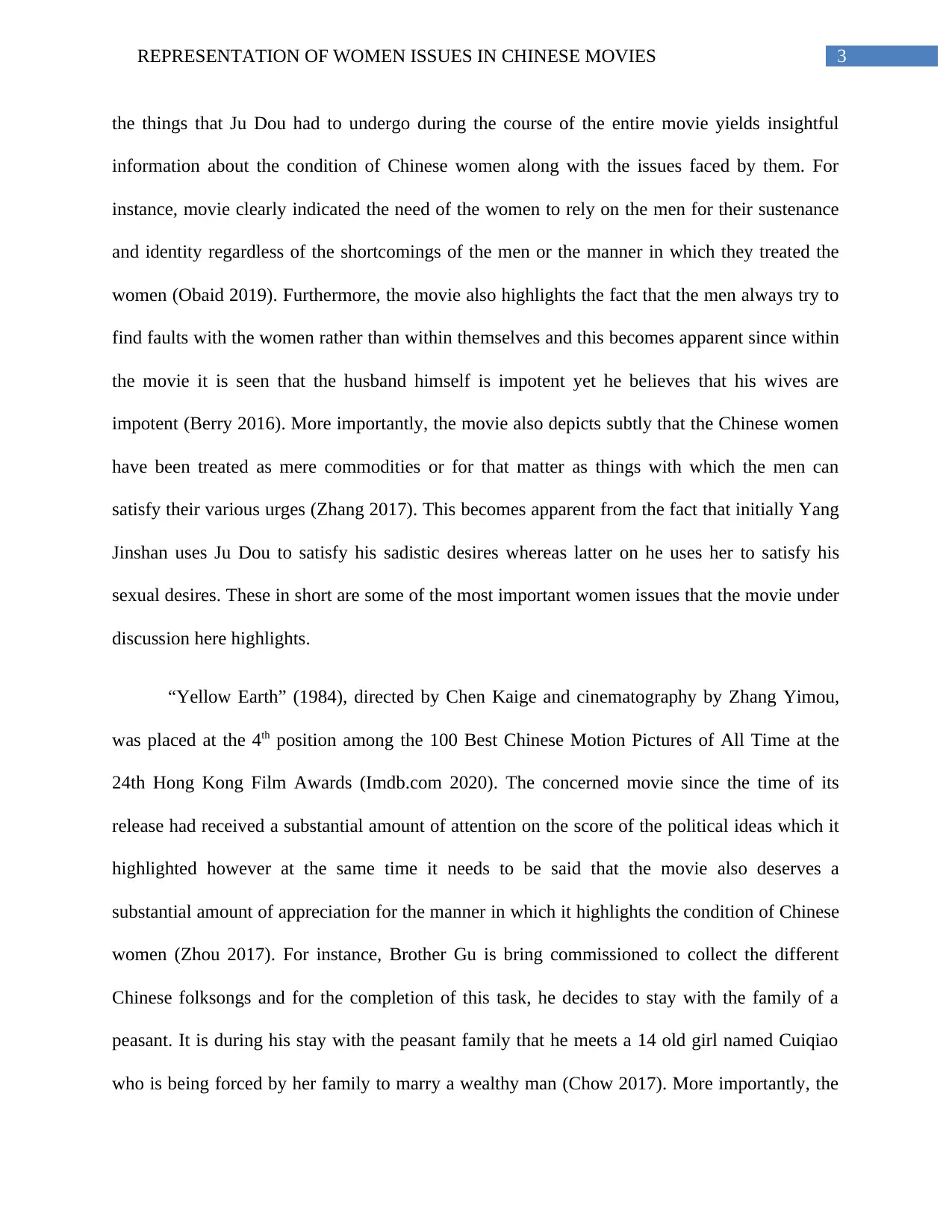
3REPRESENTATION OF WOMEN ISSUES IN CHINESE MOVIES
the things that Ju Dou had to undergo during the course of the entire movie yields insightful
information about the condition of Chinese women along with the issues faced by them. For
instance, movie clearly indicated the need of the women to rely on the men for their sustenance
and identity regardless of the shortcomings of the men or the manner in which they treated the
women (Obaid 2019). Furthermore, the movie also highlights the fact that the men always try to
find faults with the women rather than within themselves and this becomes apparent since within
the movie it is seen that the husband himself is impotent yet he believes that his wives are
impotent (Berry 2016). More importantly, the movie also depicts subtly that the Chinese women
have been treated as mere commodities or for that matter as things with which the men can
satisfy their various urges (Zhang 2017). This becomes apparent from the fact that initially Yang
Jinshan uses Ju Dou to satisfy his sadistic desires whereas latter on he uses her to satisfy his
sexual desires. These in short are some of the most important women issues that the movie under
discussion here highlights.
“Yellow Earth” (1984), directed by Chen Kaige and cinematography by Zhang Yimou,
was placed at the 4th position among the 100 Best Chinese Motion Pictures of All Time at the
24th Hong Kong Film Awards (Imdb.com 2020). The concerned movie since the time of its
release had received a substantial amount of attention on the score of the political ideas which it
highlighted however at the same time it needs to be said that the movie also deserves a
substantial amount of appreciation for the manner in which it highlights the condition of Chinese
women (Zhou 2017). For instance, Brother Gu is bring commissioned to collect the different
Chinese folksongs and for the completion of this task, he decides to stay with the family of a
peasant. It is during his stay with the peasant family that he meets a 14 old girl named Cuiqiao
who is being forced by her family to marry a wealthy man (Chow 2017). More importantly, the
the things that Ju Dou had to undergo during the course of the entire movie yields insightful
information about the condition of Chinese women along with the issues faced by them. For
instance, movie clearly indicated the need of the women to rely on the men for their sustenance
and identity regardless of the shortcomings of the men or the manner in which they treated the
women (Obaid 2019). Furthermore, the movie also highlights the fact that the men always try to
find faults with the women rather than within themselves and this becomes apparent since within
the movie it is seen that the husband himself is impotent yet he believes that his wives are
impotent (Berry 2016). More importantly, the movie also depicts subtly that the Chinese women
have been treated as mere commodities or for that matter as things with which the men can
satisfy their various urges (Zhang 2017). This becomes apparent from the fact that initially Yang
Jinshan uses Ju Dou to satisfy his sadistic desires whereas latter on he uses her to satisfy his
sexual desires. These in short are some of the most important women issues that the movie under
discussion here highlights.
“Yellow Earth” (1984), directed by Chen Kaige and cinematography by Zhang Yimou,
was placed at the 4th position among the 100 Best Chinese Motion Pictures of All Time at the
24th Hong Kong Film Awards (Imdb.com 2020). The concerned movie since the time of its
release had received a substantial amount of attention on the score of the political ideas which it
highlighted however at the same time it needs to be said that the movie also deserves a
substantial amount of appreciation for the manner in which it highlights the condition of Chinese
women (Zhou 2017). For instance, Brother Gu is bring commissioned to collect the different
Chinese folksongs and for the completion of this task, he decides to stay with the family of a
peasant. It is during his stay with the peasant family that he meets a 14 old girl named Cuiqiao
who is being forced by her family to marry a wealthy man (Chow 2017). More importantly, the
Paraphrase This Document
Need a fresh take? Get an instant paraphrase of this document with our AI Paraphraser
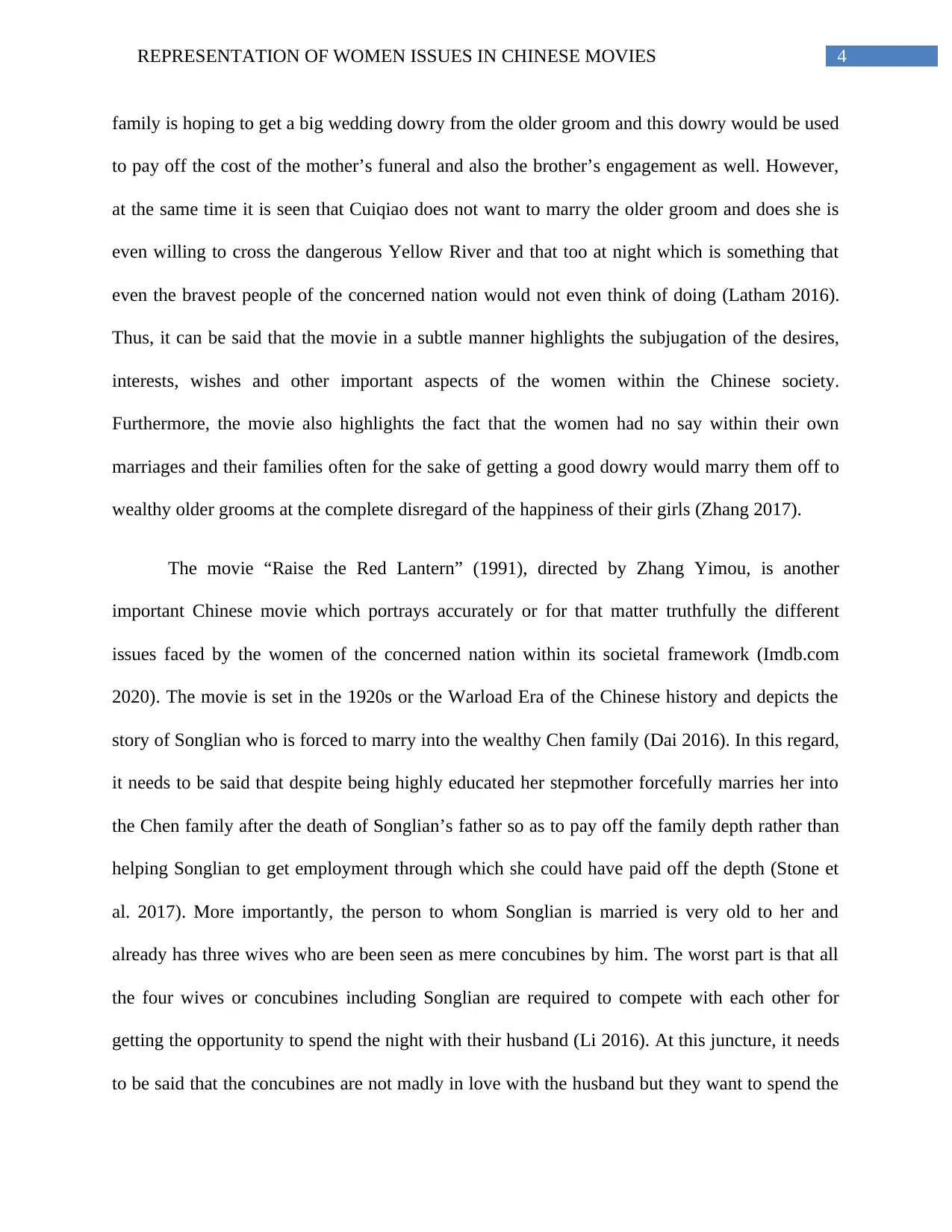
4REPRESENTATION OF WOMEN ISSUES IN CHINESE MOVIES
family is hoping to get a big wedding dowry from the older groom and this dowry would be used
to pay off the cost of the mother’s funeral and also the brother’s engagement as well. However,
at the same time it is seen that Cuiqiao does not want to marry the older groom and does she is
even willing to cross the dangerous Yellow River and that too at night which is something that
even the bravest people of the concerned nation would not even think of doing (Latham 2016).
Thus, it can be said that the movie in a subtle manner highlights the subjugation of the desires,
interests, wishes and other important aspects of the women within the Chinese society.
Furthermore, the movie also highlights the fact that the women had no say within their own
marriages and their families often for the sake of getting a good dowry would marry them off to
wealthy older grooms at the complete disregard of the happiness of their girls (Zhang 2017).
The movie “Raise the Red Lantern” (1991), directed by Zhang Yimou, is another
important Chinese movie which portrays accurately or for that matter truthfully the different
issues faced by the women of the concerned nation within its societal framework (Imdb.com
2020). The movie is set in the 1920s or the Warload Era of the Chinese history and depicts the
story of Songlian who is forced to marry into the wealthy Chen family (Dai 2016). In this regard,
it needs to be said that despite being highly educated her stepmother forcefully marries her into
the Chen family after the death of Songlian’s father so as to pay off the family depth rather than
helping Songlian to get employment through which she could have paid off the depth (Stone et
al. 2017). More importantly, the person to whom Songlian is married is very old to her and
already has three wives who are been seen as mere concubines by him. The worst part is that all
the four wives or concubines including Songlian are required to compete with each other for
getting the opportunity to spend the night with their husband (Li 2016). At this juncture, it needs
to be said that the concubines are not madly in love with the husband but they want to spend the
family is hoping to get a big wedding dowry from the older groom and this dowry would be used
to pay off the cost of the mother’s funeral and also the brother’s engagement as well. However,
at the same time it is seen that Cuiqiao does not want to marry the older groom and does she is
even willing to cross the dangerous Yellow River and that too at night which is something that
even the bravest people of the concerned nation would not even think of doing (Latham 2016).
Thus, it can be said that the movie in a subtle manner highlights the subjugation of the desires,
interests, wishes and other important aspects of the women within the Chinese society.
Furthermore, the movie also highlights the fact that the women had no say within their own
marriages and their families often for the sake of getting a good dowry would marry them off to
wealthy older grooms at the complete disregard of the happiness of their girls (Zhang 2017).
The movie “Raise the Red Lantern” (1991), directed by Zhang Yimou, is another
important Chinese movie which portrays accurately or for that matter truthfully the different
issues faced by the women of the concerned nation within its societal framework (Imdb.com
2020). The movie is set in the 1920s or the Warload Era of the Chinese history and depicts the
story of Songlian who is forced to marry into the wealthy Chen family (Dai 2016). In this regard,
it needs to be said that despite being highly educated her stepmother forcefully marries her into
the Chen family after the death of Songlian’s father so as to pay off the family depth rather than
helping Songlian to get employment through which she could have paid off the depth (Stone et
al. 2017). More importantly, the person to whom Songlian is married is very old to her and
already has three wives who are been seen as mere concubines by him. The worst part is that all
the four wives or concubines including Songlian are required to compete with each other for
getting the opportunity to spend the night with their husband (Li 2016). At this juncture, it needs
to be said that the concubines are not madly in love with the husband but they want to spend the
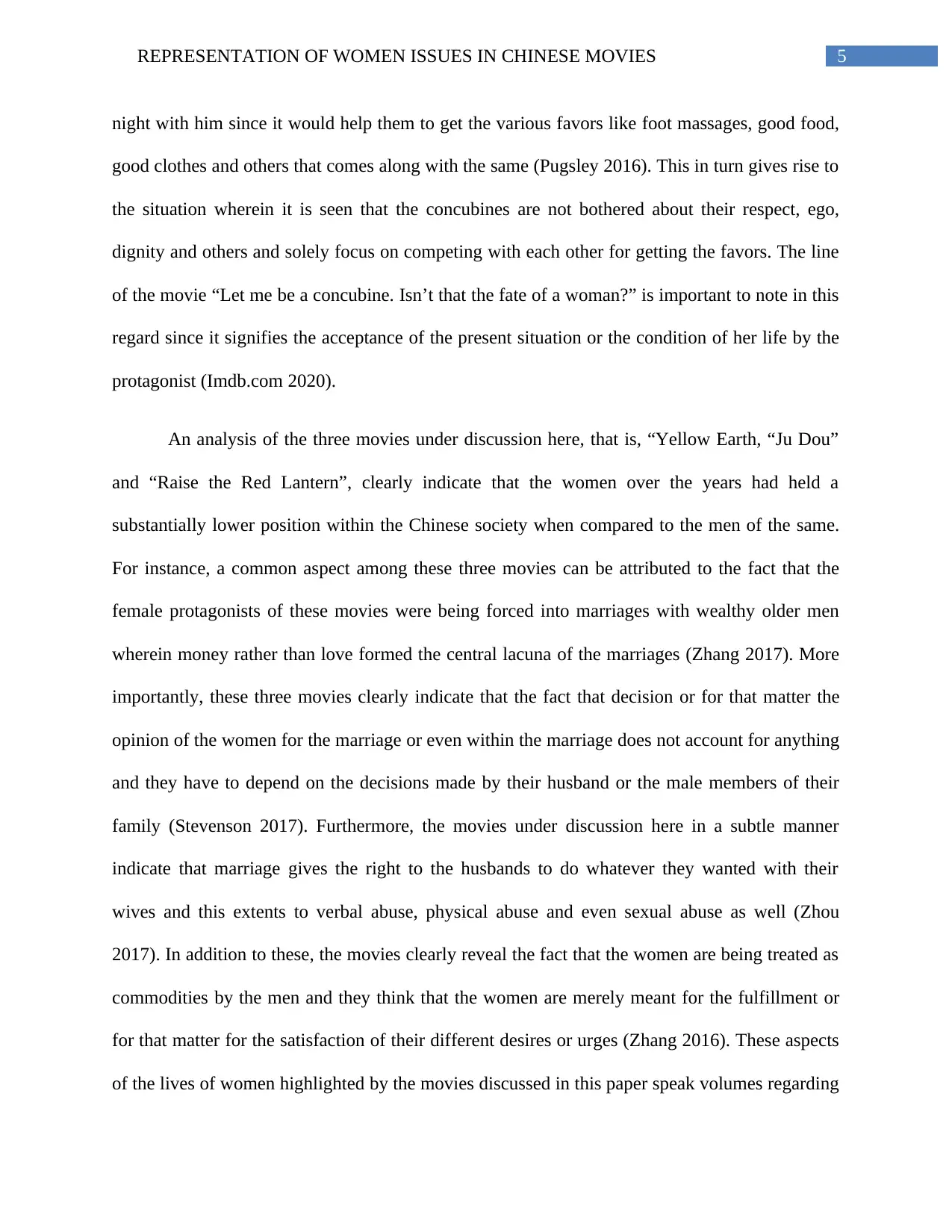
5REPRESENTATION OF WOMEN ISSUES IN CHINESE MOVIES
night with him since it would help them to get the various favors like foot massages, good food,
good clothes and others that comes along with the same (Pugsley 2016). This in turn gives rise to
the situation wherein it is seen that the concubines are not bothered about their respect, ego,
dignity and others and solely focus on competing with each other for getting the favors. The line
of the movie “Let me be a concubine. Isn’t that the fate of a woman?” is important to note in this
regard since it signifies the acceptance of the present situation or the condition of her life by the
protagonist (Imdb.com 2020).
An analysis of the three movies under discussion here, that is, “Yellow Earth, “Ju Dou”
and “Raise the Red Lantern”, clearly indicate that the women over the years had held a
substantially lower position within the Chinese society when compared to the men of the same.
For instance, a common aspect among these three movies can be attributed to the fact that the
female protagonists of these movies were being forced into marriages with wealthy older men
wherein money rather than love formed the central lacuna of the marriages (Zhang 2017). More
importantly, these three movies clearly indicate that the fact that decision or for that matter the
opinion of the women for the marriage or even within the marriage does not account for anything
and they have to depend on the decisions made by their husband or the male members of their
family (Stevenson 2017). Furthermore, the movies under discussion here in a subtle manner
indicate that marriage gives the right to the husbands to do whatever they wanted with their
wives and this extents to verbal abuse, physical abuse and even sexual abuse as well (Zhou
2017). In addition to these, the movies clearly reveal the fact that the women are being treated as
commodities by the men and they think that the women are merely meant for the fulfillment or
for that matter for the satisfaction of their different desires or urges (Zhang 2016). These aspects
of the lives of women highlighted by the movies discussed in this paper speak volumes regarding
night with him since it would help them to get the various favors like foot massages, good food,
good clothes and others that comes along with the same (Pugsley 2016). This in turn gives rise to
the situation wherein it is seen that the concubines are not bothered about their respect, ego,
dignity and others and solely focus on competing with each other for getting the favors. The line
of the movie “Let me be a concubine. Isn’t that the fate of a woman?” is important to note in this
regard since it signifies the acceptance of the present situation or the condition of her life by the
protagonist (Imdb.com 2020).
An analysis of the three movies under discussion here, that is, “Yellow Earth, “Ju Dou”
and “Raise the Red Lantern”, clearly indicate that the women over the years had held a
substantially lower position within the Chinese society when compared to the men of the same.
For instance, a common aspect among these three movies can be attributed to the fact that the
female protagonists of these movies were being forced into marriages with wealthy older men
wherein money rather than love formed the central lacuna of the marriages (Zhang 2017). More
importantly, these three movies clearly indicate that the fact that decision or for that matter the
opinion of the women for the marriage or even within the marriage does not account for anything
and they have to depend on the decisions made by their husband or the male members of their
family (Stevenson 2017). Furthermore, the movies under discussion here in a subtle manner
indicate that marriage gives the right to the husbands to do whatever they wanted with their
wives and this extents to verbal abuse, physical abuse and even sexual abuse as well (Zhou
2017). In addition to these, the movies clearly reveal the fact that the women are being treated as
commodities by the men and they think that the women are merely meant for the fulfillment or
for that matter for the satisfaction of their different desires or urges (Zhang 2016). These aspects
of the lives of women highlighted by the movies discussed in this paper speak volumes regarding
⊘ This is a preview!⊘
Do you want full access?
Subscribe today to unlock all pages.

Trusted by 1+ million students worldwide
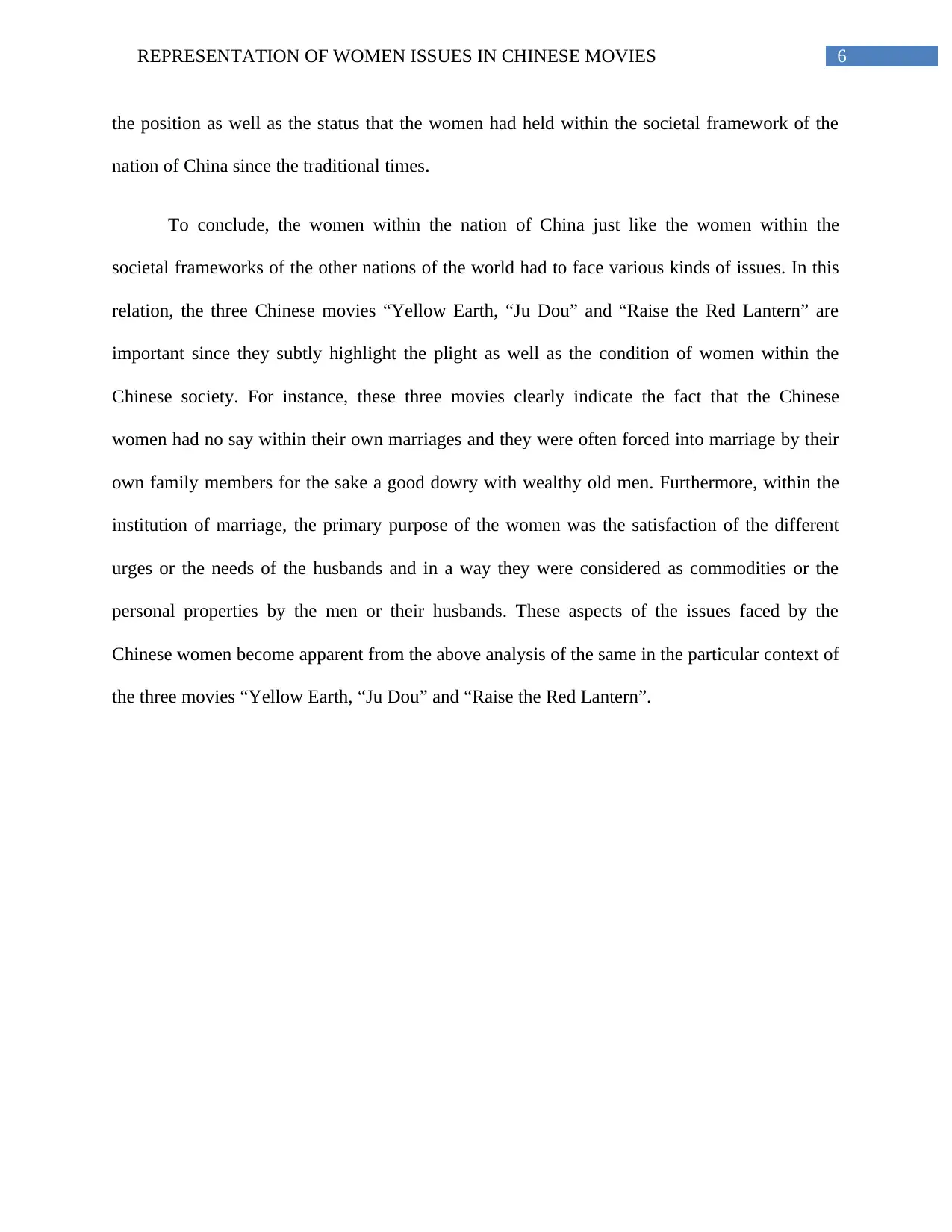
6REPRESENTATION OF WOMEN ISSUES IN CHINESE MOVIES
the position as well as the status that the women had held within the societal framework of the
nation of China since the traditional times.
To conclude, the women within the nation of China just like the women within the
societal frameworks of the other nations of the world had to face various kinds of issues. In this
relation, the three Chinese movies “Yellow Earth, “Ju Dou” and “Raise the Red Lantern” are
important since they subtly highlight the plight as well as the condition of women within the
Chinese society. For instance, these three movies clearly indicate the fact that the Chinese
women had no say within their own marriages and they were often forced into marriage by their
own family members for the sake a good dowry with wealthy old men. Furthermore, within the
institution of marriage, the primary purpose of the women was the satisfaction of the different
urges or the needs of the husbands and in a way they were considered as commodities or the
personal properties by the men or their husbands. These aspects of the issues faced by the
Chinese women become apparent from the above analysis of the same in the particular context of
the three movies “Yellow Earth, “Ju Dou” and “Raise the Red Lantern”.
the position as well as the status that the women had held within the societal framework of the
nation of China since the traditional times.
To conclude, the women within the nation of China just like the women within the
societal frameworks of the other nations of the world had to face various kinds of issues. In this
relation, the three Chinese movies “Yellow Earth, “Ju Dou” and “Raise the Red Lantern” are
important since they subtly highlight the plight as well as the condition of women within the
Chinese society. For instance, these three movies clearly indicate the fact that the Chinese
women had no say within their own marriages and they were often forced into marriage by their
own family members for the sake a good dowry with wealthy old men. Furthermore, within the
institution of marriage, the primary purpose of the women was the satisfaction of the different
urges or the needs of the husbands and in a way they were considered as commodities or the
personal properties by the men or their husbands. These aspects of the issues faced by the
Chinese women become apparent from the above analysis of the same in the particular context of
the three movies “Yellow Earth, “Ju Dou” and “Raise the Red Lantern”.
Paraphrase This Document
Need a fresh take? Get an instant paraphrase of this document with our AI Paraphraser
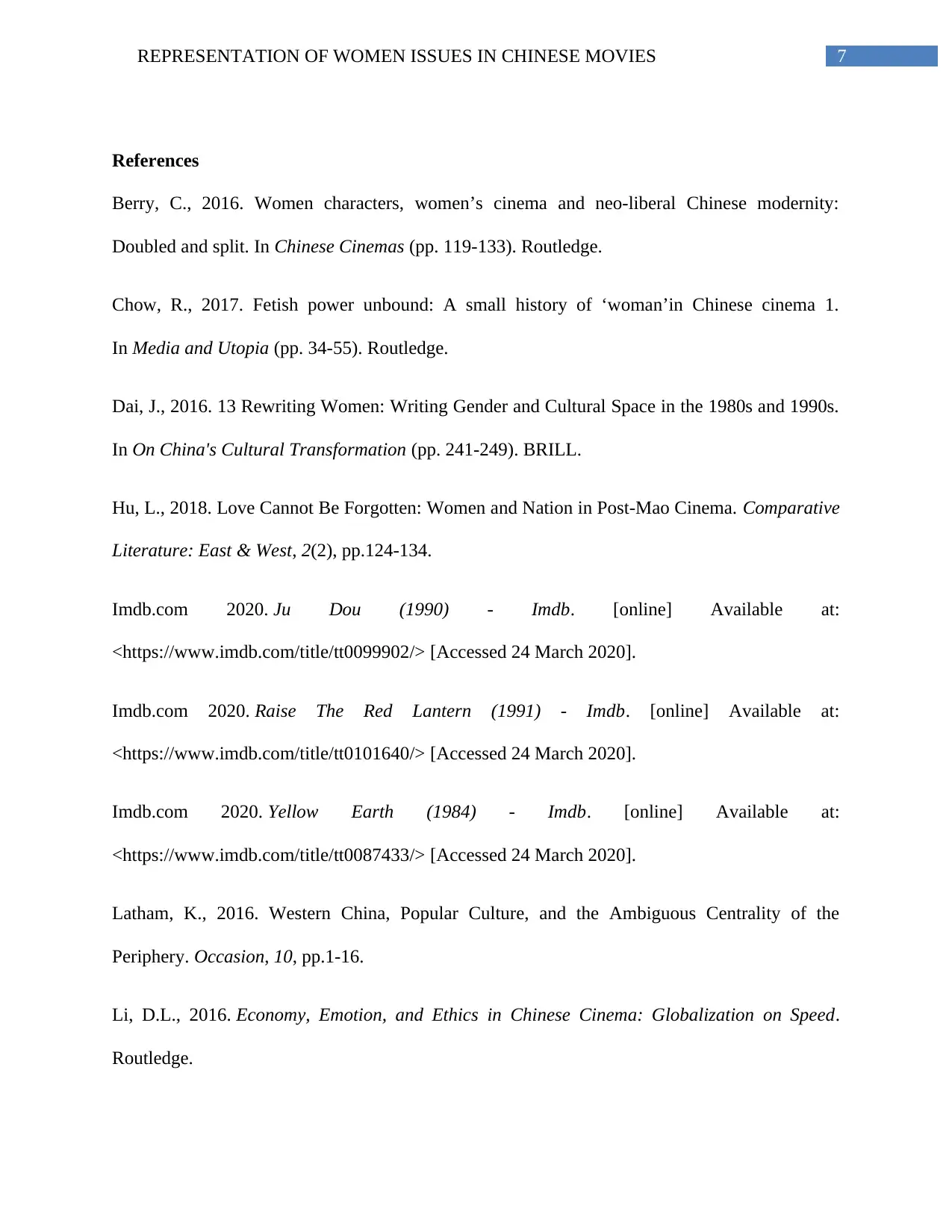
7REPRESENTATION OF WOMEN ISSUES IN CHINESE MOVIES
References
Berry, C., 2016. Women characters, women’s cinema and neo-liberal Chinese modernity:
Doubled and split. In Chinese Cinemas (pp. 119-133). Routledge.
Chow, R., 2017. Fetish power unbound: A small history of ‘woman’in Chinese cinema 1.
In Media and Utopia (pp. 34-55). Routledge.
Dai, J., 2016. 13 Rewriting Women: Writing Gender and Cultural Space in the 1980s and 1990s.
In On China's Cultural Transformation (pp. 241-249). BRILL.
Hu, L., 2018. Love Cannot Be Forgotten: Women and Nation in Post-Mao Cinema. Comparative
Literature: East & West, 2(2), pp.124-134.
Imdb.com 2020. Ju Dou (1990) - Imdb. [online] Available at:
<https://www.imdb.com/title/tt0099902/> [Accessed 24 March 2020].
Imdb.com 2020. Raise The Red Lantern (1991) - Imdb. [online] Available at:
<https://www.imdb.com/title/tt0101640/> [Accessed 24 March 2020].
Imdb.com 2020. Yellow Earth (1984) - Imdb. [online] Available at:
<https://www.imdb.com/title/tt0087433/> [Accessed 24 March 2020].
Latham, K., 2016. Western China, Popular Culture, and the Ambiguous Centrality of the
Periphery. Occasion, 10, pp.1-16.
Li, D.L., 2016. Economy, Emotion, and Ethics in Chinese Cinema: Globalization on Speed.
Routledge.
References
Berry, C., 2016. Women characters, women’s cinema and neo-liberal Chinese modernity:
Doubled and split. In Chinese Cinemas (pp. 119-133). Routledge.
Chow, R., 2017. Fetish power unbound: A small history of ‘woman’in Chinese cinema 1.
In Media and Utopia (pp. 34-55). Routledge.
Dai, J., 2016. 13 Rewriting Women: Writing Gender and Cultural Space in the 1980s and 1990s.
In On China's Cultural Transformation (pp. 241-249). BRILL.
Hu, L., 2018. Love Cannot Be Forgotten: Women and Nation in Post-Mao Cinema. Comparative
Literature: East & West, 2(2), pp.124-134.
Imdb.com 2020. Ju Dou (1990) - Imdb. [online] Available at:
<https://www.imdb.com/title/tt0099902/> [Accessed 24 March 2020].
Imdb.com 2020. Raise The Red Lantern (1991) - Imdb. [online] Available at:
<https://www.imdb.com/title/tt0101640/> [Accessed 24 March 2020].
Imdb.com 2020. Yellow Earth (1984) - Imdb. [online] Available at:
<https://www.imdb.com/title/tt0087433/> [Accessed 24 March 2020].
Latham, K., 2016. Western China, Popular Culture, and the Ambiguous Centrality of the
Periphery. Occasion, 10, pp.1-16.
Li, D.L., 2016. Economy, Emotion, and Ethics in Chinese Cinema: Globalization on Speed.
Routledge.
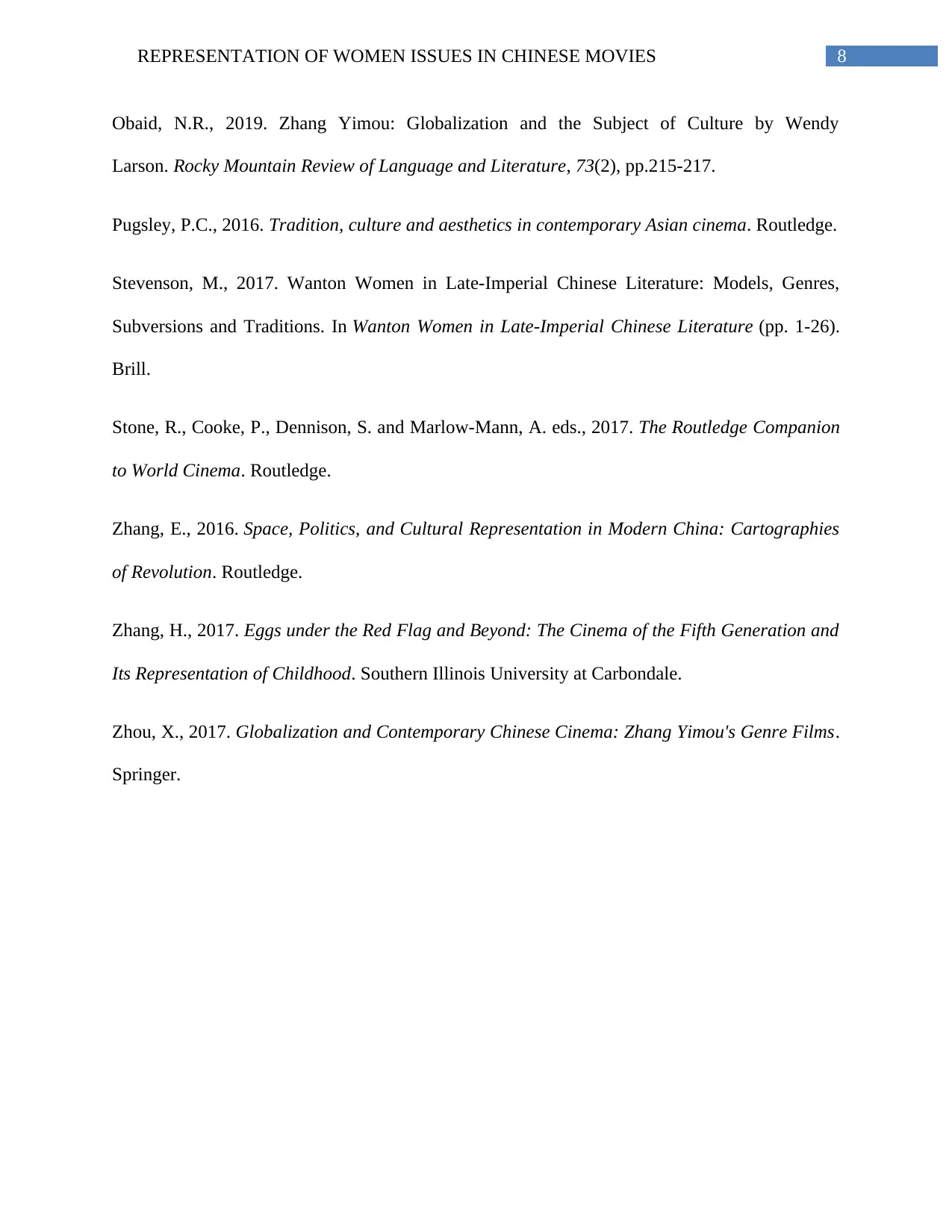
8REPRESENTATION OF WOMEN ISSUES IN CHINESE MOVIES
Obaid, N.R., 2019. Zhang Yimou: Globalization and the Subject of Culture by Wendy
Larson. Rocky Mountain Review of Language and Literature, 73(2), pp.215-217.
Pugsley, P.C., 2016. Tradition, culture and aesthetics in contemporary Asian cinema. Routledge.
Stevenson, M., 2017. Wanton Women in Late-Imperial Chinese Literature: Models, Genres,
Subversions and Traditions. In Wanton Women in Late-Imperial Chinese Literature (pp. 1-26).
Brill.
Stone, R., Cooke, P., Dennison, S. and Marlow-Mann, A. eds., 2017. The Routledge Companion
to World Cinema. Routledge.
Zhang, E., 2016. Space, Politics, and Cultural Representation in Modern China: Cartographies
of Revolution. Routledge.
Zhang, H., 2017. Eggs under the Red Flag and Beyond: The Cinema of the Fifth Generation and
Its Representation of Childhood. Southern Illinois University at Carbondale.
Zhou, X., 2017. Globalization and Contemporary Chinese Cinema: Zhang Yimou's Genre Films.
Springer.
Obaid, N.R., 2019. Zhang Yimou: Globalization and the Subject of Culture by Wendy
Larson. Rocky Mountain Review of Language and Literature, 73(2), pp.215-217.
Pugsley, P.C., 2016. Tradition, culture and aesthetics in contemporary Asian cinema. Routledge.
Stevenson, M., 2017. Wanton Women in Late-Imperial Chinese Literature: Models, Genres,
Subversions and Traditions. In Wanton Women in Late-Imperial Chinese Literature (pp. 1-26).
Brill.
Stone, R., Cooke, P., Dennison, S. and Marlow-Mann, A. eds., 2017. The Routledge Companion
to World Cinema. Routledge.
Zhang, E., 2016. Space, Politics, and Cultural Representation in Modern China: Cartographies
of Revolution. Routledge.
Zhang, H., 2017. Eggs under the Red Flag and Beyond: The Cinema of the Fifth Generation and
Its Representation of Childhood. Southern Illinois University at Carbondale.
Zhou, X., 2017. Globalization and Contemporary Chinese Cinema: Zhang Yimou's Genre Films.
Springer.
⊘ This is a preview!⊘
Do you want full access?
Subscribe today to unlock all pages.

Trusted by 1+ million students worldwide
1 out of 9
Your All-in-One AI-Powered Toolkit for Academic Success.
+13062052269
info@desklib.com
Available 24*7 on WhatsApp / Email
![[object Object]](/_next/static/media/star-bottom.7253800d.svg)
Unlock your academic potential
Copyright © 2020–2025 A2Z Services. All Rights Reserved. Developed and managed by ZUCOL.